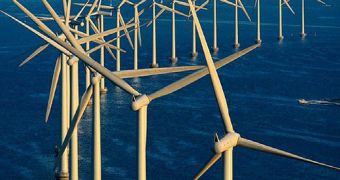According to the German newspaper Welt am Sonntag, quoting the Transport Minister Wolfgang Tiefensee, Germany will build up to 30 offshore wind farms by the end of 2030 in order to increase the contribution of the renewable energy sources to the total amount of power produced by the country, thus cutting a significant mass of greenhouse gases currently emitted while generating energy by burning fossil fuels.
The wind farms will be built in the Baltic and North seas and will involve the installation of about 2,000 windmills, generating about 11,000 megawatts of power. "The goal is 25,000 megawatts of energy from windfarms by 2030. The rise in the oil price has made this all the more pressing and the interest from investors shows that it is economically viable," said Tiefensee in an interview yesterday.
The project will begin construction by the end of this year with the installation of the first wind farm on the Borkum island in the North Sea. The windmills themselves will be produced by the French energy company Areva and will be delivered via the German renewable energy company Prokon Nord.
The project is a direct consequence of a law passed last month by the Bundestag, stating that Germany is to increase the contribution of renewable energy source to the total amount of power generated by the country from the current 14 percent to 30 percent by the end of 2020. Up to a quarter of this amounts should be produced with the help of wind power.
Also, all of Germany's 17 nuclear power plants are scheduled for closure by 2020, although not all politicians, including Chancellor Angela Merkel, believe that shutting down the nuclear reactors is going to help significantly in the efforts to reduce the country's dependency on fossil fuels.
Nevertheless, all agree that investing in wind farms is much better than keeping the nuclear power plants running. "We believe in renewable energy and not in nuclear energy," said Tiefensee.

 14 DAY TRIAL //
14 DAY TRIAL //